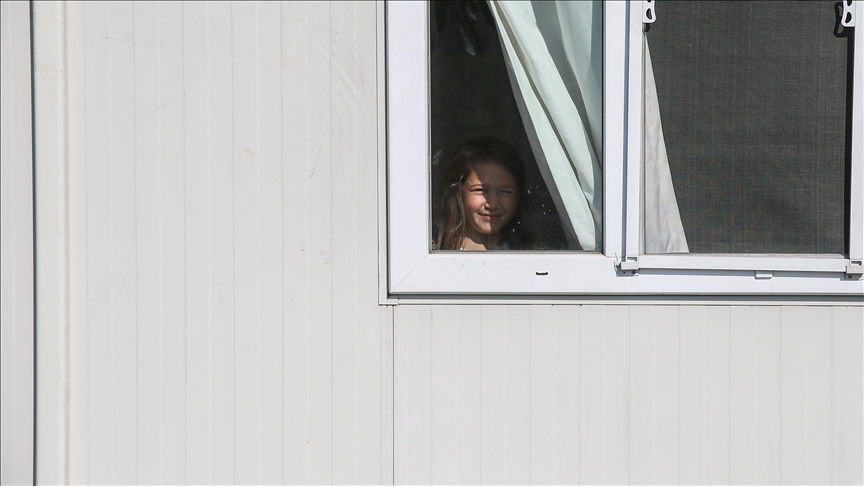Around 13.5 million people have been affected by the earthquakes that hit Turkey and Syria.
Housing containers from Qatar and other nations are on their way to Turkey to help earthquake victims, according to the Turkish transport and infrastructure minister.
Containers are set to arrive at Turkish ports and be distributed to the earthquake-affected districts, Adil Karaismailoglu stated on Friday at a news conference in the province of Adiyaman.
“We are working on the transfer of our citizens living in tent cities to container cities,” he said, according to reports.
The first container ships, which departed on 14 February after being filled with cargo from Qatar, are anticipated to reach the Iskenderun Port on 3 or 4 March.
Some 1,388 living containers and 627 pallets of humanitarian aid are carried by the five ships that departed in stages.
The building of housing areas and the reconstruction of the city will be carried out concurrently, according to Karaismailoglu, who also stated that the start of the construction of new homes is the most crucial item on the schedule.
Earlier this month, two major earthquakes struck Turkey and Syria, followed by another 6.3 magnitude quake two weeks later. The natural disaster resulted in more than 50,000 deaths and left hundreds of thousands homeless across both countries.
Ten thousand mobile houses have been promised by Qatar to those who were harmed by the initial devastating earthquakes. Some 306 fully furnished residences were delivered to Turkey on 12 February as part of the first batch.
The mobile homes were previously utilised as accommodations for the FIFA World Cup Qatar 2022 and Qatar had always planned to donate them as part of the 2022 World Cup legacy plans.
Separately, NATO said a ship carrying 600 temporary container homes has departed Italy and is on its way to Turkey.
More than 1,000 containers will be sent by the military alliance, acting as temporary homes for at least 4,000 people who were made homeless by the quakes.
Qatar rushes to help
Qatar has been heavily involved in rescue operations since the initial incident in early February.
Just hours after the initial earthquake, Qatar’s Amir Sheikh Tamim bin Hamad Al-Thani held a phone call with Turkish President Recep Tayyip Erdogan, in which he expressed his condolences to the people of Turkey.
Immediately after the quakes, Qatar quickly dispatched a search and rescue team from Lekhwiya – Qatar’s internal security force – and donated tonnes of much-needed aid.
Qatar’s amir ordered the launch of an air bridge to Turkey fully equipped with field hospitals, relief aid, and tents among other essential rescue equipment.
Doha News was on the ground as the Lekhwiya team joined international rescue operations in hopes of detecting signs of life under the rubble.
Sheikh Tamim was the first leader to visit Turkey in the aftermath of the tragedy.
Earlier this month, the foreign ministry said Qatar’s humanitarian aid to victims in both countries amounted to around QAR 253 million.
The amir also personally donated QAR 50 million ($14 million) to earthquake victims on live television during the Oun and Sanad campaign, contributing to the QAR 168,015,836 (around $19 million) raised.
“Qatar has put all its capabilities at the disposal of the brothers in Turkey to support them after the earthquake disaster,” Dr Majed Al Ansari, Qatar’s Foreign Ministry spokesman, told Anadolu Agency earlier this month.
Dr Al Ansari noted that Qatar’s rescue and relief support is “a major priority at present” and its role there will “continue during the various stages of this crisis as long as it’s needed.
Separately, across the border in Syria, the northern region of the country was particularly hit hard after suffering through more than a decade-long brutal crisis under the Bashar Al Assad regime.
Qatar Charity began operating eight health centres worth QAR 7 million as well as a bakery that produces more than 5,000 bundles of bread daily in Syria.
A team from the Qatari International Search and Rescue Group also visited several Syrian areas adjacent near the Turkish border, including Jindires.
The Qatar Fund For Development joined the Syrian Civil Defence, also known as the White Helmets, to help with search and rescue operations. Volunteer medics were also deployed to help with complex surgeries.







